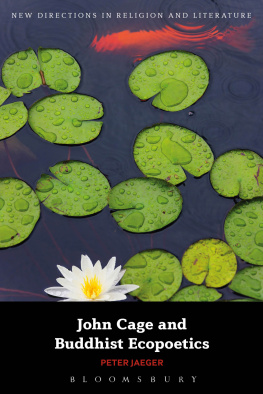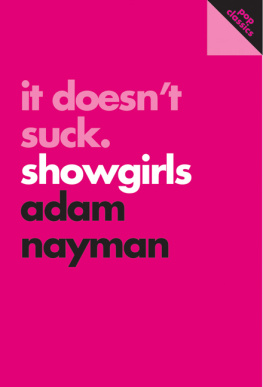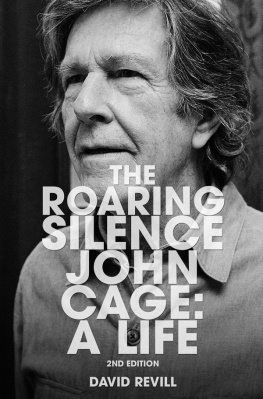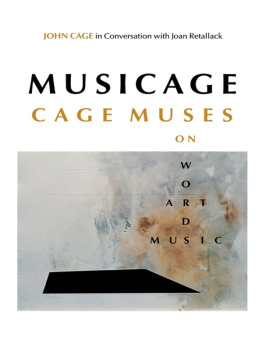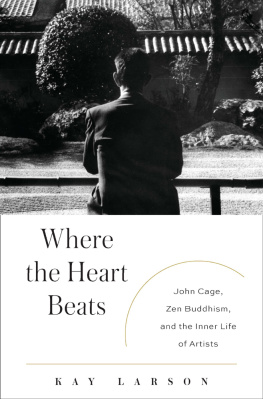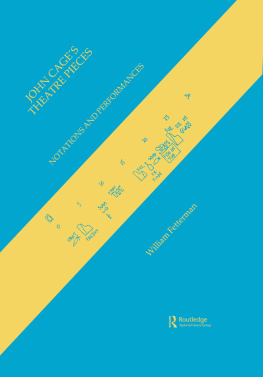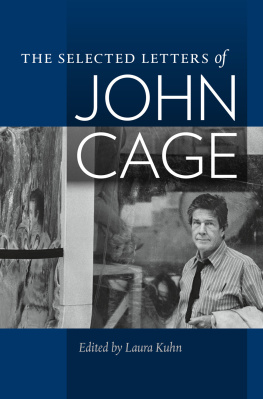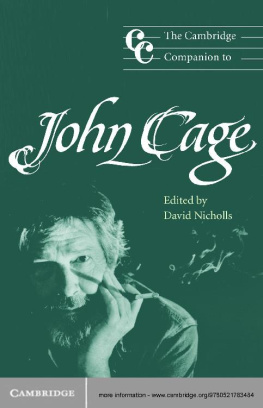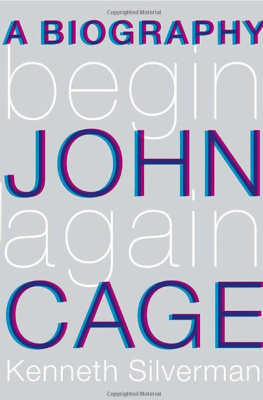John Cage and Buddhist Ecopoetics
NEW DIRECTIONS IN RELIGION AND LITERATURE
This series aims to showcase new work at the forefront of religion and literature through short studies written by leading and rising scholars in the field. Books will pursue a variety of theoretical approaches as they engage with writing from different religious and literary traditions. Collectively, the series will offer a timely critical intervention to the interdisciplinary crossover between religion and literature, speaking to wider contemporary interests and mapping out new directions for the field in the early twenty-first century.
ALSO AVAILABLE FROM BLOOMSBURY:
Blake. Wordsworth. Religion, Jonathan Roberts
Do the Gods Wear Capes?, Ben Saunders
Englands Secular Scripture, Jo Carruthers
Glyph and the Gramophone , Luke Ferretter
The Late Walter Benjamin , John Schad
The New Atheist Novel , Arthur Bradley and Andrew Tate
Victorian Parables , Susan E. Coln
FORTHCOMING:
Faithful Reading , Mark Knight and Emma Mason
Rewriting the Old Testament in Anglo-Saxon Verse , Samantha Zacher
John Cage and Buddhist Ecopoetics
PETER JAEGER
New Directions in Religion and Literature

Bloomsbury Academic
An imprint of Bloomsbury Publishing Plc
| 50 Bedford Square | 1385 Broadway |
| London | New York |
| WC1B 3DP | NY 10018 |
| UK | USA |
www.bloomsbury.com
First published 2013
Peter Jaeger, 2013
All rights reserved. No part of this publication may be reproduced or transmitted in any form or by any means, electronic or mechanical, including photocopying, recording or any information storage or retrieval system, without prior permission in writing from the publishers.
Peter Jaeger has asserted his right under the Copyright, Designs and Patents Act, 1988, to be identified as Author of this work.
No responsibility for loss caused to any individual or organization acting on or refraining from action as a result of the material in this publication can be accepted by Bloomsbury Academic or the author.
British Library Cataloguing-in-Publication Data
A catalogue record for this book is available from the British Library.
ePub ISBN: 978-1-6235-6543-5
Library of Congress Cataloging-in-Publication Data
A catalog record for this title is available from the Library of Congress.
Typeset by Deanta Global Publishing Services, Chennai, India
In the land of perfect freedom there are no words
( The Lankavtra Sutra )
Contents
M y gratitude goes to the Arts and Humanities Research Council for funding research expeditions and time away from university duties during the completion of this book. Thanks also goes to Laura Kuhn at the John Cage Trust, Bard College, N.Y. and to the Getty Institute in Los Angeles, for permission to access archival material. Tim Atkins, derek beaulieu, Nancy Gillespie, Harry Gilonis, John Havelda, Jeff Hilson, Jenna Kotch and Ruth Windle deserve thanks for providing research leads and for helping to clarify my thought on Cage and on some of the texts theoretical background. Thanks also to Charles Bernstein, Marjorie Perloff, Robert Hampson and Frank Davey for their continuing interest in my research. John Gaynor, Doug Landles, Michael Barbour, Zoketsu Norman Fisher and Bhadra warrant special thanks for their advice and example pertaining to the Dharma . This series editors Mark Knight and Emma Mason have been wonderfully supportive through the various stages of this books production. Their advice has been invaluable.
John Cage and Buddhist Ecopoetics has grown out of several talks and short articles which have appeared in earlier forms and contexts. Thanks to Jerzy Kutnik for arranging to have a short section translated into Polish by the Crossroads Centre for Intercultural Creative Initiatives and published in Cage 100 (2013), and to Emmanuelle Waeckerle for publishing an excerpt in the Yorkshire Artspace and University of the Creative Arts co-publication Booklive! (2013). I would also like to thank the organizers and support staff of the many conferences and public lectures where I have presented parts of this book during the John Cage centennial year: David Ayers, organizer of the Material Meanings Conference hosted by the European Network for Avant-Garde and Modernism Studies, University of Kent, Canterbury, England; Desmond Biddulph and Louise Marchant of the Art History and Culture Talks series at the Buddhist Society, London; Nik Cesare and Matt Jones, organizers of the Future of Cage: Credo 100 conference, University of Toronto, Canada; Jerome Fletcher at Performance Writing 12 , the Arnolfini Gallery, Bristol, England; Nancy Gillespie at the Kootenay School of Writing in Vancouver, Canada; Robert Hampson at the Contemporary Innovative Poetry Research Seminar, Royal Holloway College, University of London; Kevin Killian for hosting a talk and reading based on this research at the California College of Art in San Francisco; Jerzy Kutnik at the John Cage 100 Symposium held in Lublin, Poland; John Lo Breglio and Eoin Flannery at the English and Modern Languages/Europe-Japan Research Centre, Oxford Brookes University, Oxford; Michelle Naka Pierce of the Jack Kerouac School of Disembodied Poetics for inviting me to participate in the fourthirtythree: Caged! event at Naropa University in Boulder, Colorado; William Rowe and Stephen Mooney at the Poetry and Revolution International Conference , held at the Contemporary Poetics Research Centre, Birkbeck College, University of London; Nicola Sim at the Whitechapel Gallery in London for organizing a talk on Cage; Emmanuelle Waeckerle, organizer of the Book Live Symposium at the London South Bank University.
Thanks also to the various publishers who have agreed to grant permission to quote from their books. Quotations by John (Wesleyan University Press) 2007, reprinted with permission of the Estate of Philip Whalen.
A special note of thanks to my family, who put up with my near-constant absence while thinking about nothing. This book is for you.
I n 2012 the celebrated pianist and interpreter of John Cage, Margaret Leng Tan, contributed a talk and performance to the Cage centennial celebrations in Lublin, Poland. Tans talk focused primarily on Cages interest in Zen, paying special attention to his understanding of time and space as it pertains to his Buddhist faith. She spoke of Cages Zen-influenced belief that time and space are inseparable and that in fact Cage thought these two categories were alive ; for Tan (and Cage) the living relationship between space and time is what distinguishes Asian thought from the philosophies of the West. Tan also pointed out that much of Cages work embodies the concurrent unfolding of time and space. After the talk, Tan circulated a photo-copied sheet of paper containing short excerpts drawn from news media reports about ivory poaching. The paper was also stamped by hand in green ink with the phrase: TOY PIANOS DONT KILL ELEPHANTS an allusion to the various pieces that Cage wrote specifically for the toy piano during the 1940s. She then performed the infamous of 1952 on a toy piano, as well as Cages 1959 piece Water Walk . Tans talk and performance brought together the important relationship between Zen and ecological awareness that informed Cages work, not only in his role as a composer of music but also as a visual artist and writer. Although these three fields of Cages cultural production were highly inter-related, it is this last area of his activity his writing and poetics that this book seeks to address. How did Cages understanding of Zen and his concern for environmental issues impact his writing? To what extent did the interface of these two concerns spill over into other issues raised by his lecture-poems and poetry, such as his turn towards indeterminacy and chance operations in the 1950s and his later works support for non-violent anarchism? And what do his challenge to more conventional modes of making meaning, his frequent use of blank space as a visual poetic element, and his embrace of the illegible, have to do with his Zen Buddhist ecopoetics?
Next page
